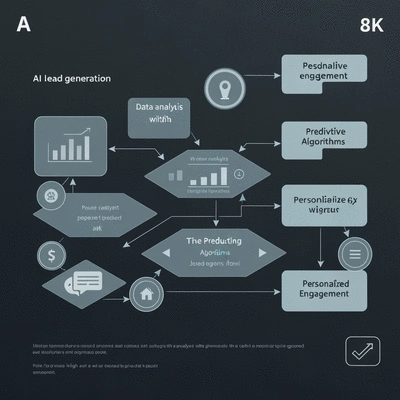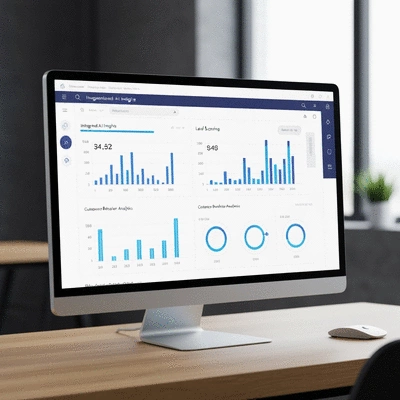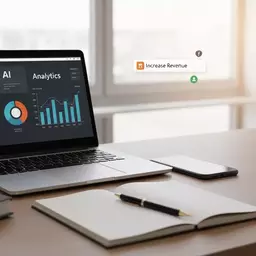Integrating AI with CRM Systems

In an era where every business is chasing digital leads, the power of AI in lead generation is not just an option—it's a necessity. Harnessing this technology can transform your marketing strategy and elevate your customer engagement to unprecedented heights.
What You Will Learn
- AI lead generation leverages data analysis and predictive algorithms to identify potential customers more efficiently than traditional methods.
- Integrating AI with CRM systems improves lead scoring and enhances customer insights, leading to more personalized engagement.
- Personalization is key—using AI to tailor communications based on customer behavior significantly boosts conversion rates.
- Implementing best practices, such as defining integration goals and investing in team training, ensures a smooth transition to AI-enabled systems.
- Staying updated on future trends like increased machine learning integration and AI-driven insights is essential for maintaining a competitive edge.
AI and CRM Integration: Process Flow and Benefits
This visual illustrates the key processes and benefits of integrating AI tools with CRM systems, highlighting how they streamline lead generation and enhance customer engagement.
AI Lead Generation Process
Benefits of AI-CRM Integration
Key Integration Best Practices
Future Trends to Watch

Understanding the Role of AI in Lead Generation and CRM Integration
In today’s fast-paced business world, AI lead generation has emerged as a transformative tool that can significantly enhance your marketing efforts. By automating processes and analyzing vast amounts of data, AI can uncover potential leads more efficiently than traditional methods. As highlighted by Salesforce's insights into AI, this technology is revolutionizing how businesses operate. This article will delve into the essentials of AI in lead generation and how it integrates with Customer Relationship Management (CRM) systems to create a streamlined approach to sales.
So, what exactly is AI lead generation? At its core, it involves using artificial intelligence to identify and engage potential customers through data analysis and predictive algorithms. This allows businesses like My AI Business Coach to not only reach more leads but also engage them in a more personalized manner. By understanding customer behaviors and preferences, AI can deliver tailored content that resonates, leading to higher conversion rates!
What is AI Lead Generation and How Does It Work?
AI lead generation utilizes machine learning algorithms to process data and identify prospects that are more likely to convert. It works through various methods, including:
- Predictive analytics: Analyzes past customer behavior to forecast future actions.
- Behavioral targeting: Uses online activity to understand customer preferences and interests.
- Chatbots: Engages with website visitors in real-time, gathering information to qualify leads.
This automated approach not only saves time but also allows businesses to focus on more strategic tasks. As a business strategist, I’ve seen firsthand how leveraging these AI tools can lead to increased efficiency and improved results! For more details on government initiatives in this area, you can refer to the information available at CIO.gov's AI in Action.
Benefits of Integrating AI Tools with CRM Systems
Integrating AI tools with CRM systems brings numerous benefits that can enhance your overall business operations. Here are some key advantages:
- Improved lead scoring: AI can analyze data points to prioritize leads based on their likelihood to convert.
- Enhanced customer insights: It helps in understanding customer behavior, allowing for more personalized engagement.
- Increased efficiency: Automation of repetitive tasks frees up your team to focus on strategy and creativity.
This integration creates a seamless flow of information, enabling teams to respond more quickly to customer needs and ultimately driving higher sales performance. At My AI Business Coach, we emphasize the importance of leveraging these tools to maximize your business potential!
Exploring Customer Relationship Management (CRM) and Its Importance in Lead Generation
Customer Relationship Management (CRM) systems are essential for managing a company’s interactions with current and potential customers. They serve as a centralized hub for all customer data, which is crucial for effective lead generation. Here’s why CRM is vital:
- Centralized data storage: All customer interactions and data are stored in one place, making it easier to access and analyze.
- Enhanced customer tracking: Track customer interactions over time to understand their journey and interests.
- Streamlined communication: Collaborate more effectively within your team using shared insights and customer histories.
By utilizing CRM systems effectively, businesses can create targeted marketing strategies that result in higher lead generation success. As I often remind my clients, the goal is to build meaningful relationships that lead to long-term growth!
Engage with Us!
As we explore the integration of AI with CRM systems, we want to hear your thoughts. How do you envision AI transforming your lead generation strategies? Share your insights below:
Frequently Asked Questions About AI in Lead Generation and CRM Integration
What is AI lead generation?
AI lead generation uses artificial intelligence, machine learning, and predictive algorithms to identify, qualify, and engage potential customers more efficiently than traditional methods. It analyzes data to understand customer behavior and preferences.
How does AI integrate with CRM systems?
AI integrates with CRM systems by feeding analyzed data and insights into the CRM. This enhances lead scoring, provides deeper customer insights, automates repetitive tasks, and allows for more personalized customer interactions directly within the CRM platform.
What are the main benefits of AI-CRM integration?
The primary benefits include improved lead scoring and prioritization, enhanced customer insights and personalization, increased operational efficiency through automation, and ultimately, higher conversion rates and sales performance.
Why is personalization important in AI lead generation?
Personalization is crucial because it allows businesses to tailor communications and content based on individual customer behavior and preferences. This resonates more deeply with prospects, significantly boosting engagement and conversion rates.
What are the key best practices for implementing AI-CRM integration?
Key best practices involve defining clear integration goals, investing in comprehensive team training, regularly monitoring and evaluating performance, utilizing AI for predictive analytics, ensuring data cleanliness, and fostering collaboration between sales and marketing teams.
What future trends should businesses watch in AI lead generation?
Future trends include increased machine learning integration for improved lead scoring, greater integration of AI with social media platforms for broader outreach, and enhanced user experiences through advanced AI chatbots providing real-time assistance. According to Forrester's 2023 report on AI in the public sector, these trends are already shaping various industries.

Summarizing Best Practices for AI and CRM Integration
As we wrap up our exploration of AI and CRM integration, it's essential to highlight the best practices that can guide your implementation strategy. Embracing these practices not only enhances your lead generation efforts but also positions your business for sustainable growth. Here are some key takeaways:
- Define clear integration goals to align AI capabilities with your CRM needs.
- Invest in training for your team to ensure they understand how to leverage new tools.
- Monitor and evaluate your integration performance regularly to identify areas for improvement.
By focusing on these best practices, you can maximize the potential of both AI and CRM systems, transforming them into powerful allies in your business growth journey.
Key Takeaways from Effective Integration Strategies
There are several important lessons we've learned from businesses successfully integrating AI with their CRM systems. For instance, personalization is key—use AI to tailor communications and offers based on customer behavior. Additionally, automation helps streamline processes, reducing manual effort and improving response times. Here are some vital points to consider:
- Utilize AI for predictive analytics to anticipate customer needs.
- Ensure your data is clean and well-organized to facilitate smooth integration.
- Fostering collaboration between sales and marketing teams for a unified approach is also critical.
Implementing these strategies will not only enhance your efficiency but also improve customer satisfaction by delivering timely and relevant interactions.
Looking Ahead: Future Trends in AI Lead Generation and CRM
The landscape of AI lead generation and CRM is continuously evolving, and staying ahead of the curve is crucial. In the coming years, we can expect to see a greater emphasis on AI-driven insights that enhance decision-making processes. As AI technologies advance, they will offer deeper insights into customer behavior, allowing for even more refined targeting strategies. Here are a few trends to watch:
- Increased use of machine learning for improved lead scoring.
- Greater integration of AI with social media platforms for broader outreach.
- Enhanced user experience through AI chatbots providing real-time assistance.
By keeping an eye on these trends, you can proactively adapt your strategies and tools to better meet customer expectations and drive business success.
Implementing Multi-Channel Marketing for Enhanced Engagement Metrics
To truly capitalize on your AI and CRM integration, adopting a multi-channel marketing approach can significantly boost engagement metrics. This strategy allows you to reach your customers through various touchpoints, ensuring consistent communication. As you consider this approach, think about integrating the following channels:
- Email marketing campaigns tailored through AI insights.
- Social media interactions that leverage CRM data for personalized messaging.
- SMS notifications to provide timely updates and promotions to your leads.
Utilizing these channels effectively can create a seamless experience for your customers, making them feel valued and understood, ultimately driving higher conversion rates.
Taking Action: Next Steps for Integrating AI with Your CRM
Now that we've discussed the best practices and future trends, it's time to take action. Integrating AI with your CRM is not just a technological upgrade; it's a strategic move towards future-proofing your business. Let's outline the next steps you should consider:
Assessing Your Current CRM and AI Tool Landscape
Before diving into the integration process, it's vital to assess the tools you currently have in place. Take stock of the following:
- Identify your existing CRM capabilities and any gaps in functionality.
- Evaluate the AI tools available to ensure they can seamlessly integrate with your CRM.
- Consider your team's familiarity with both tools to gauge training needs.
This assessment will provide a clear picture of your starting point and help you chart a path forward.
Creating a Roadmap for Implementation and Optimization
With a clear understanding of your tools, the next step is to create a comprehensive roadmap. This should include:
- Defining specific milestones and timelines for the integration process.
- Assigning responsibilities within your team for each phase of the implementation.
- Establishing key performance indicators (KPIs) to measure success.
Having a structured plan will keep your team aligned and focused, making the integration process smoother and more efficient.
Measuring Performance Metrics for Continuous Improvement
Finally, once your integration is underway, it's crucial to continuously measure performance. This involves:
- Regularly reviewing the effectiveness of AI-driven strategies against your established KPIs.
- Gathering feedback from your team and customers to identify areas for enhancement.
- Adjusting your strategies based on data insights to ensure ongoing optimization.
By prioritizing measurement and adaptation, you’ll ensure that your AI and CRM integration delivers the intended results and evolves with your business needs.
Recap of Key Points
Here is a quick recap of the important points discussed in the article:
- AI lead generation automates processes, allowing for more efficient identification of potential leads.
- Integrating AI with CRM systems improves lead scoring, enhances customer insights, and increases operational efficiency.
- Utilizing predictive analytics and behavioral targeting helps tailor communications and optimize engagement strategies.
- A structured roadmap and regular performance measurement are crucial for successful integration of AI and CRM tools.
- Adopting a multi-channel marketing approach can significantly boost customer engagement and conversion rates.
Popular Posts
 Have you ever wondered how artificial intelligence can reshape consumer behavior and decision-making
Have you ever wondered how artificial intelligence can reshape consumer behavior and decision-making
 As the digital landscape evolves, small businesses are discovering that artificial intelligence is n
As the digital landscape evolves, small businesses are discovering that artificial intelligence is n
 Did you know that personalized marketing can lead to a revenue increase of up to 30%? In an era wher
Did you know that personalized marketing can lead to a revenue increase of up to 30%? In an era wher
 Are you aware that reactivating dormant customers can significantly enhance your business growth? Ma
Are you aware that reactivating dormant customers can significantly enhance your business growth? Ma
